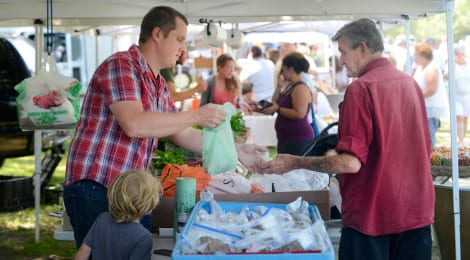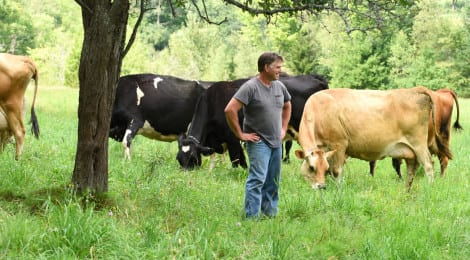
Grantee Profile
Rhode Island Food Strategy
Rhode Island took a big step forward for U.S. food systems last year, when Governor Gina Raimondo brought in Sue AnderBois as the first governor-appointed Director of Food Strategy in the nation. In this new role, AnderBois has been tasked with developing and implementing the Rhode Island Food Strategy, a comprehensive and actionable vision for a sustainable and equitable food system. As the Director of Food Strategy, AnderBois collaborates across state agencies including the Department of Environmental Management (DEM), the Department of Health, the RI Commerce Corporation, and the Governor’s office, among others.
While AnderBois’ official title is Director of Food Strategy, her self-appointed title is Rhode Island’s “head food cheerleader.” This self-appointed title is particularly appropriate, given her excitement and enthusiasm for the Food Strategy and her dynamic new position. The New Jersey native is now an ardent Rhode Islander, bringing an incredible amount of energy, passion, and expertise to Rhode Island’s already-thriving food scene.
Food is an integral part of Rhode Island’s culture, character, and history – from the Ocean State’s numerous active ports and farms to its world-renowned restaurants. According to the USDA’s Agriculture Census and contrary to nationwide trends, the number of farms in the state increased by 50% from 2002-2012 and the number of farm operators under 34 years old has nearly doubled. Given Rhode Island’s history and culture surrounding food, it makes sense that Rhode Island was the first state to appoint a designated person to lead food strategy and policy efforts statewide.
Governor Gina Raimondo has made a point to prioritize food insecurity and community health and recognize food as vital to Rhode Island’s character. But she also sees a strategic business opportunity to leverage food as a tool for economic development. With lead support from the Kendall Foundation, Rhode Island was able to build upon its already well-established statewide and regional food systems work and demonstrate its commitment to food with the hiring of AnderBois and development of the Food Strategy.

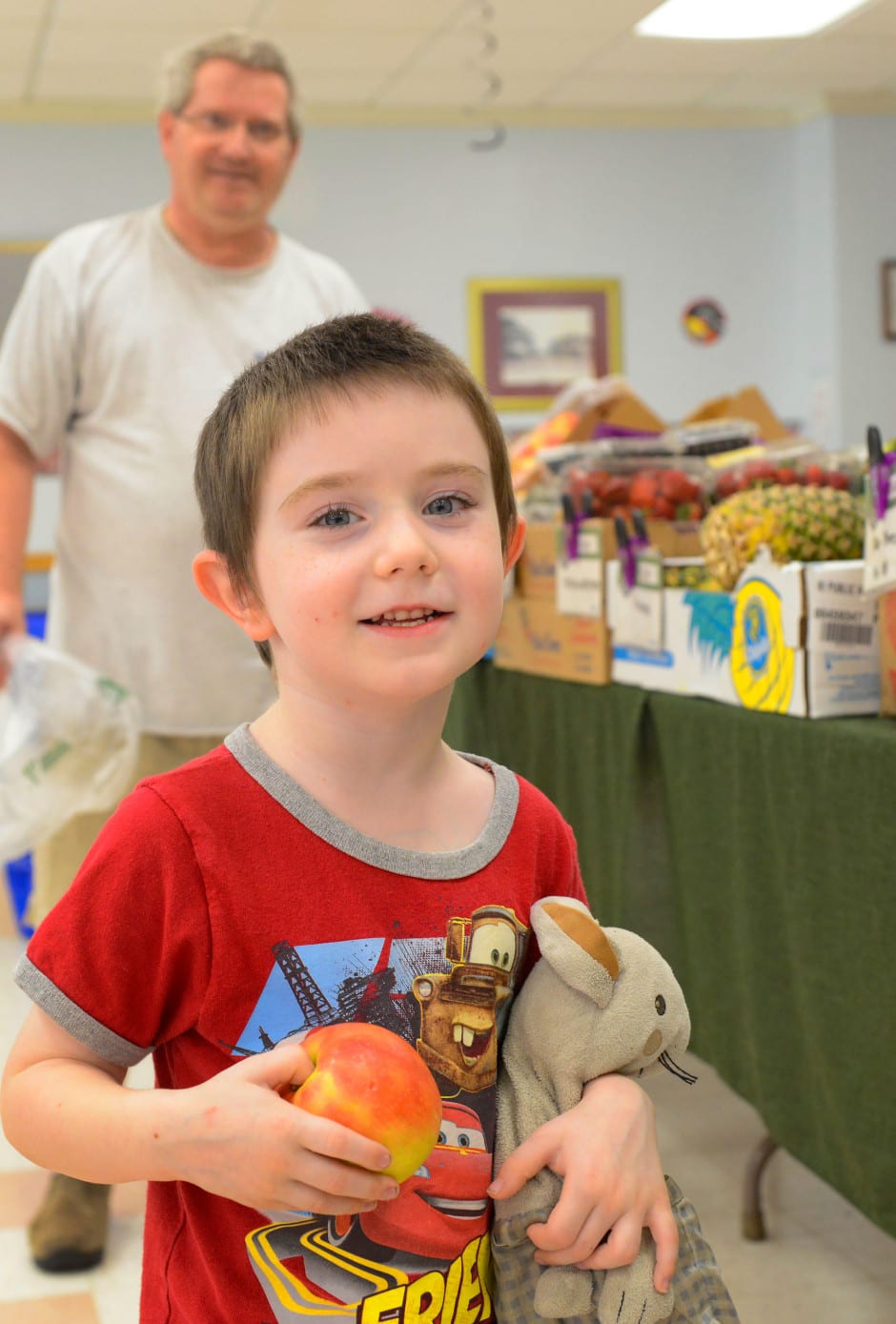
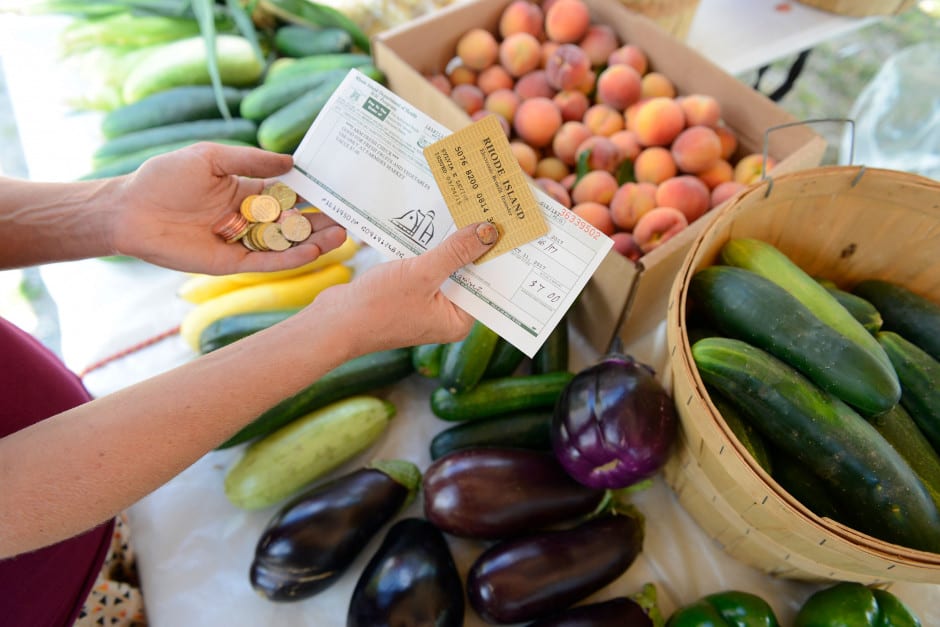
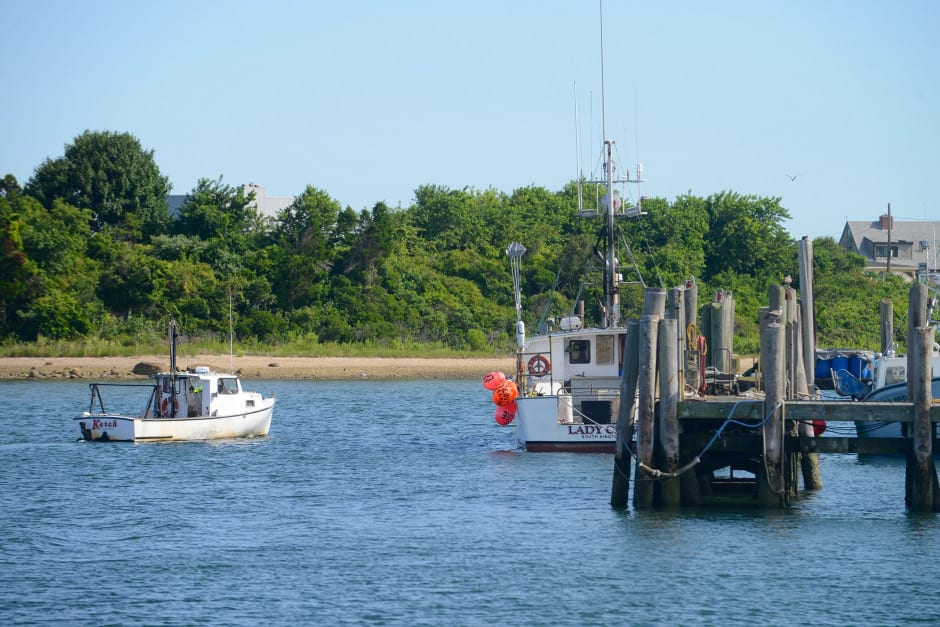
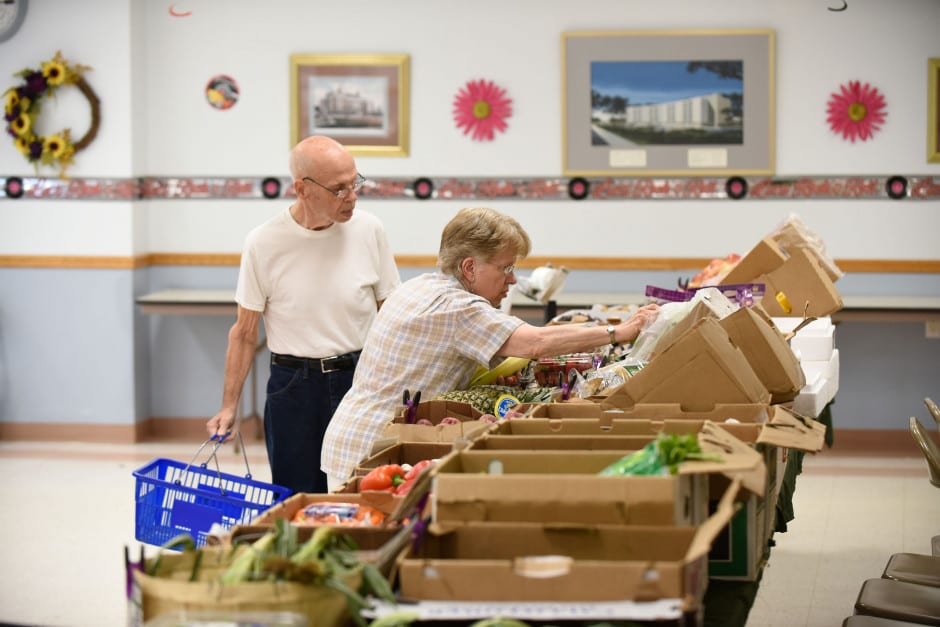
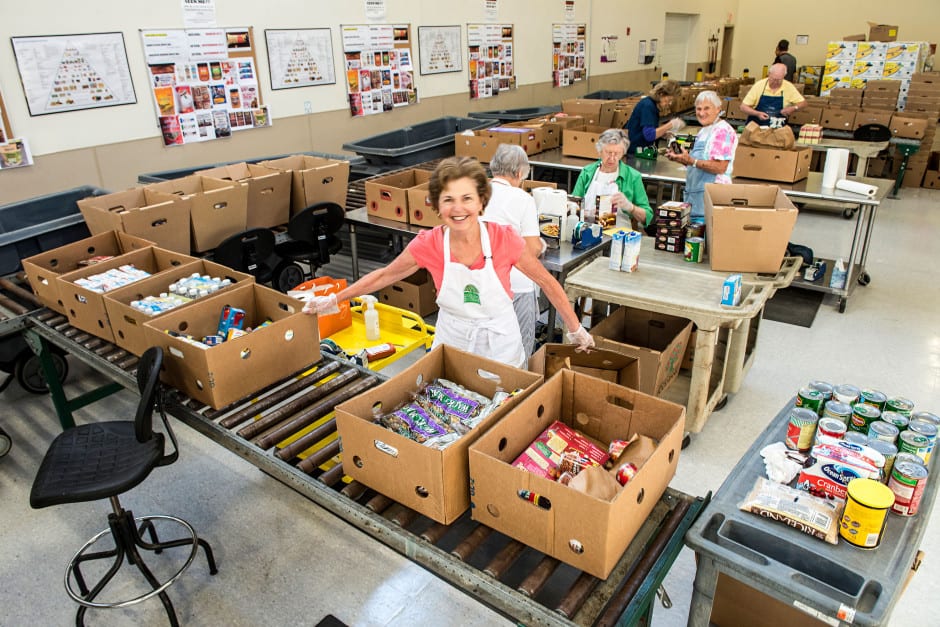
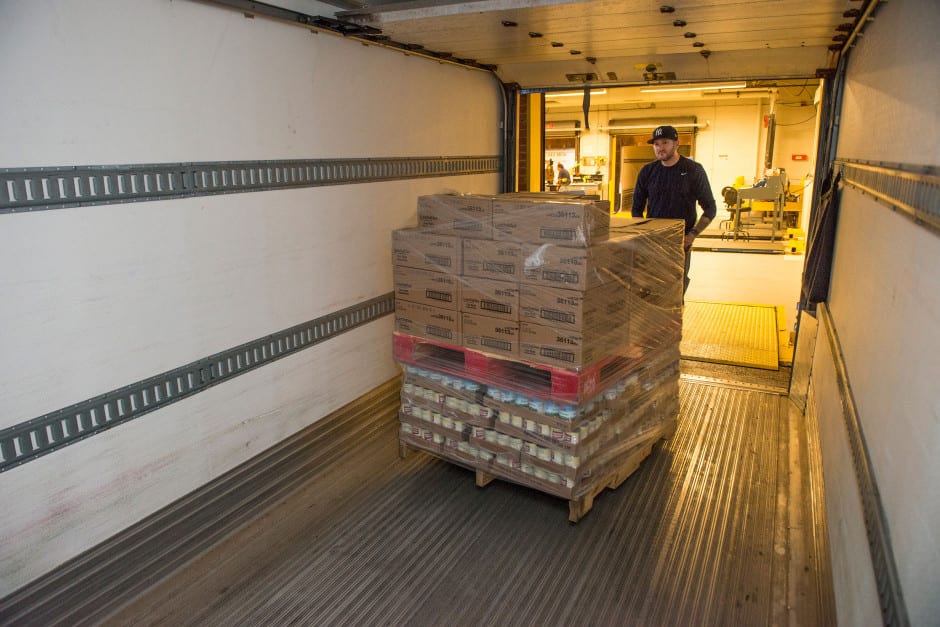
Before becoming Rhode Island’s Director of Food Strategy, AnderBois was involved in food and clean energy policy. She worked as an assistant to Alice Waters, a well-known food activist, in California, and volunteered as an environmental educator on a farm for five years. She served on the board of CitySeed in New Haven, Connecticut, a nonprofit organization that seeks to provide access to fresh, local food for the city’s residents and engage the community in growing an equitable, local food system that promotes economic development, community development, and sustainable agriculture.
When she and her husband moved to Rhode Island, AnderBois did not waste any time in getting involved with the food scene – she attended an Environmental Committee meeting of the RI Food Policy Council on her very first day in the new state. She worked in clean energy policy at first, given her experience in that area and the greater availability of jobs, but could not stay away from food. AnderBois was an active member on the board of Farm Fresh RI and joined the RI Food Policy Council. Soon enough, there were mumblings in the Rhode Island food world about a new Director of Food Strategy position. She knew she had to have this job.
Of course, the idea for the position was not dreamt up overnight. Being able to create such a position reflects the vast amount of work that the state had already been doing in this space over the past several years. AnderBois called it a “serendipitous coming together” of many different actors involved in the food system, including:
- The Department of Environmental Management (DEM) has been protecting farmland and developing the infrastructure for direct retail sales from farmer’s markets for decades, under the leadership of Chief of Agriculture Ken Ayars.
- The Rhode Island Food Policy Council (RIFPC) was established in 2011 to advocate for an improved local food system, grow and coordinate the food systems network, and lead policy efforts.
- The RI Agricultural Partnership had developed a five-year strategic plan for agricultura that guided much of the collaborative work from 2011-2015.
The RIFPC, in partnership with the DEM, released the Update to the RI Food Assessment: 2011-2016 and Beyond last year, a report that provided a framework to assess progress made since 2011 and identify gaps that still remained. The report explores the connections and synergies among multiple aspects of the food system, highlighting the interactions between local food, public health, the environment, and economic growth in the state of Rhode Island. Last year’s update, paired with the initial version released in 2011, provided critical data and context that laid the groundwork for the development of the Food Strategy.
The Food Strategy, designed as a five-year action plan, revolves around three central themes: Health & Access, Economic Development, and Environmental Sustainability & Resiliency. These themes are further organized into five integrated focus areas, each of which has a set of recommended action steps with supporting metrics:
- Preserve & Grow Agriculture, Fisheries Industries in Rhode Island
- Sustain & Create Markets for Rhode Island Food, Beverage Products
- Minimize Food Waste & Divert it from the Waste Stream
- Enhance the Climate for Food & Beverage Businesses
- Ensure Food Security for All Rhode Islanders
In developing the Food Strategy over the past year, AnderBois conducted a “listening tour” and engaged in conversations with Rhode Islanders across the state. “There was so much going on,” she said. “We had all the pieces of the puzzle, yet it was like we were missing the top of the box. What are we going to do with all of this?” Identifying those three themes, informed by conversations and collaboration with leadership, provided the top of the box that Sue was looking for.
“We’re really grateful to have Sue doing the work at the policy level,” said Amy Nunn, Executive Director of the Rhode Island Public Health Institute (RIPHI). RIPHI sponsors Food on the Move, a mobile market program that brings discounted fresh fruit and vegetable markets directly into neighborhoods year-round. Food on the Move helps surmount the major barriers to healthy food consumption, such as the high cost of produce, people having little time to shop, and limited access to high quality produce in low income neighborhoods. Residents at Dexter Manor, an elderly affordable housing community in Providence, can now shop for colorful fruits and vegetables in their lobby-turned-market and enjoy a cooking demo from a Johnson & Wales University culinary student. RIPHI was also recently awarded a multi-year grant from the USDA to help Supplemental Nutrition Assistance Program (SNAP) participants increase their purchases of fruits and vegetables.
Despite AnderBois’ comprehensive and strategic approach to food, she recognizes that this work comes with a unique set of challenges. “If this was easy it would be done already, and we wouldn’t need a food plan,” jokes AnderBois. But Rhode Island has a lot to be excited about. The Food Strategy has already received positive feedback since its release, with people reaching out to see how their organizations might fit into the plan. Now that the Food Strategy has been developed and released, AnderBois and her partners will turn their energy and focus to its implementation. Rhode Island’s small size, dense population, and accessible government afford it a unique level of collaboration that would be more difficult to achieve elsewhere. AnderBois is excited to lead the charge towards an equitable and sustainable Rhode Island food system, and Rhode Island is ready to lead the nation.
If this was easy it would be done already, and we wouldn’t need a food plan.

